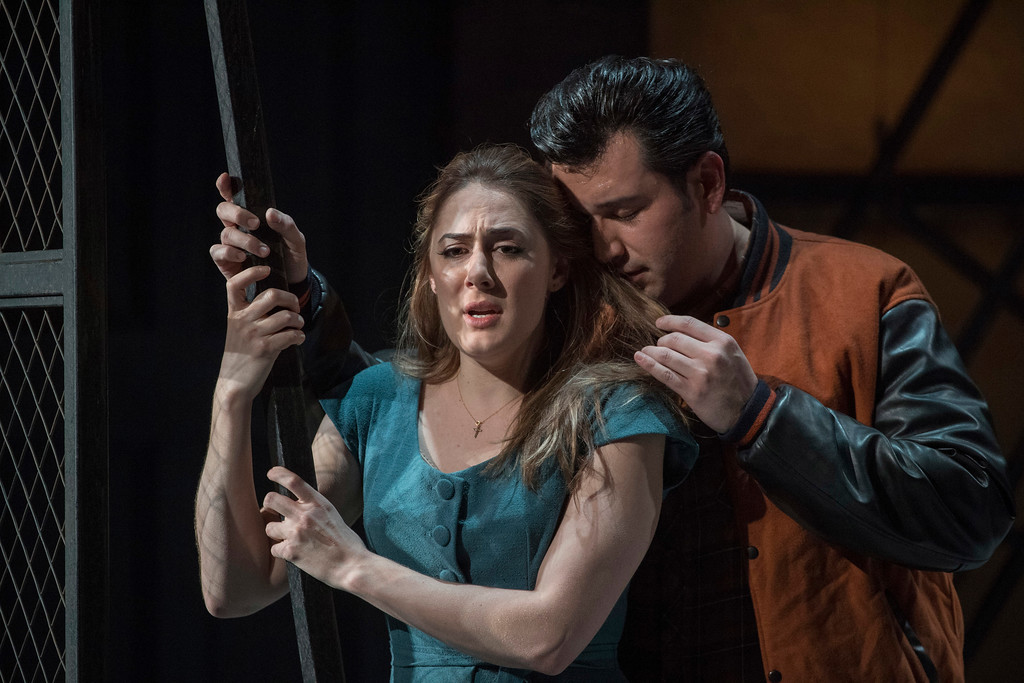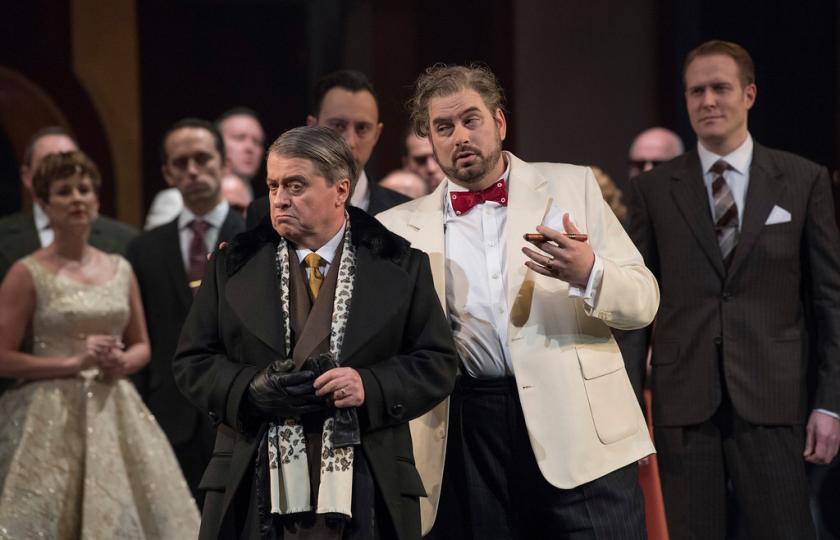This was supposed to be a triumphant return – one final encore for the production so good that audiences just couldn’t let it go. Instead, this 13th revival of Jonathan Miller’s Mafia Rigoletto seems like an apology. The designs are handsome as ever, the concept as neat, but the details of both direction and music are so scrappy and scattered that the show feels more like a basement clear-out than a loving restoration.
Raw, gritty brass launched the Prelude harshly on opening night, setting the tone for an evening where beauty was consistently the last, rather than then first, consideration. The score is delivered uncut, with no interpolated top notes permitted, as though conductor Richard Armstrong aimed to match the naturalism of the visuals with an equally unselfconscious, occasionally ugly, musical delivery. Perhaps if the production were better cast or sung that might work, but here it took away from the music without repaying anything in the drama.
It’s the principals who really suffer, abandoned time and again with nothing to do
According to the programme, ENO staff director Elaine Tyler-Hall is responsible for this revival, but it’s hard to see much evidence of her work. The crowd scenes work well enough (though lack the collective menace they can so easily convey), but it’s the principals who really suffer, abandoned time and again in unlikely positions with nothing to do, desperately filling time with hand-wringing, head-shaking and all the other stock theatrical gestures of the unsupported actor. There’s no attention to musical detail either. Verdi’s score clearly tells us when the door to Sparafucile’s seedy bar swings open and the storm blows in, so why not time entries with it? Likewise, the gag with the jukebox in “La donne e mobile” would have been a lot funnier if the blow dealt to the machine by the Duke had been timed exactly to the restarting of the music.
Musically things are little better. Armstrong directs a pedestrian performance, high on volume and low on senstivity, that only occasionally takes flight, generally when accompanying ravishing American soprano Sydney Mancasola (pictured below with Joshua Guerrero). Her Gilda spins cleanly and clearly, the unexpected colour of the bottom of her voice anchoring an easy, blooming upper register. Her musicality is hobbled however in ensembles by Nicholas Pallesen’s stentorian Rigoletto, who rushes and drags by turns, never really reaching an agreement with Armstrong and his tempi in this, his role debut. Joshua Guerrero’s Duke is adequate – sings nicely enough, if with rather gripped tone, acts nicely enough – but if you remember that this is a role recently taken at ENO by Barry Banks, and before that by the radiant Michael Fabiano, then it rather puts things in perspective. The supporting roles offer some consolation, from Nicholas Folwell’s glorious Monterone, dispatching his curse with ferocious conviction, to Madeleine Shaw’s thickly sensual Maddalena and Barnaby Rea’s Sparafucile – beautifully sung.
Joshua Guerrero’s Duke is adequate – sings nicely enough, if with rather gripped tone, acts nicely enough – but if you remember that this is a role recently taken at ENO by Barry Banks, and before that by the radiant Michael Fabiano, then it rather puts things in perspective. The supporting roles offer some consolation, from Nicholas Folwell’s glorious Monterone, dispatching his curse with ferocious conviction, to Madeleine Shaw’s thickly sensual Maddalena and Barnaby Rea’s Sparafucile – beautifully sung.
Rosemary Vercoe and Patrick Robertson’s sets scrub up a treat; there’s nothing tired about Miller’s visuals, and the production could quite happily do another couple of decades if required. But it deserves much better than it gets here. If ENO is looking to box-office favourites like this Rigoletto to help balance the books then it is going to have invest in them – not money, but time and attention. It’s not enough just to dust off a hit and stick it back on stage. There’s nothing less forgivable than a second-rate production of a first-class show. Sort it out.
- Rigoletto is at English National Opera until 28 February, 2016
- More opera reviews on theartsdesk















Add comment